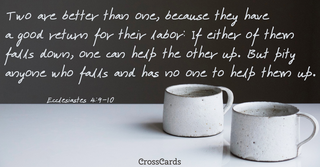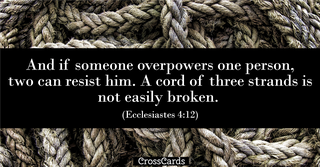Change Translation
- Recent Translations
- All Translations
Ecclésiaste 4:10
Share
Listen to Ecclésiaste 4:10
Settings
Scripture Text Size
10
Car, s'ils tombent, l'un relève son compagnon; mais malheur à celui qui est seul et qui tombe, sans avoir un second pour le relever!
Ecclésiaste 4:10 Meaning and Commentary
Ecclesiastes 4:10
another to help him up;
no companion to raise him up when fallen; no Christian friend to visit and comfort him when sick, to relieve him under his necessities, when poor and afflicted, or to recover him from errors in judgment, or immoralities in practice; and especially if he has not Christ with him to raise him up, keep, and uphold him.
For if they fall, the one will lift up his fellow
That is, if anyone of them fall, the other will lift him up, as they are travelling together, in whatsoever manner; if one falls from his horse, or out of his carriage, or into a ditch, the other will endeavour to raise him up again: this, as it is true in a natural, so in a figurative and metaphorical sense, with religious persons especially;
``if one of them falls upon the bed, and lies sick,''as the Targum paraphrases it, his friend and brother in a religions community will visit him, and sympathize with him, and speak a word of comfort to him, and pray with him, which may issue in his restoration. So the Targum,
``the other will cause his friend to rise by his prayer;''or if he fall into outward distress, poverty, and want, his spiritual friend or friends will distribute to his necessity; if he falls into errors, as a good man may, such as are of the same religious society with him will take some pains to convince him of the error of his way, and to convert him from it, and to save a soul from death, and cover a multitude of sins; and if he falls into sin, to which the best of men are liable, such as are spiritual will endeavour to restore him in a spirit of meekness; but woe to him [that is] alone when he falleth! for [he hath] not
another to help him up;
no companion to raise him up when fallen; no Christian friend to visit and comfort him when sick, to relieve him under his necessities, when poor and afflicted, or to recover him from errors in judgment, or immoralities in practice; and especially if he has not Christ with him to raise him up, keep, and uphold him.
Taken from John Gill's Exposition of the Bible
Unlock Deeper Insights: Get Over 20 Commentaries with Plus! Subscribe Now
Ecclésiaste 4:10 In-Context
8
Tel homme est seul et sans personne qui lui tienne de près, il n'a ni fils ni frère, et pourtant son travail n'a point de fin et ses yeux ne sont jamais rassasiés de richesses. Pour qui donc est-ce que je travaille, et que je prive mon âme de jouissances? C'est encore là une vanité et une chose mauvaise.
9
Deux valent mieux qu'un, parce qu'ils retirent un bon salaire de leur travail.
10
Car, s'ils tombent, l'un relève son compagnon; mais malheur à celui qui est seul et qui tombe, sans avoir un second pour le relever!
11
De même, si deux couchent ensemble, ils auront chaud; mais celui qui est seul, comment aura-t-il chaud?
12
Et si quelqu'un est plus fort qu'un seul, les deux peuvent lui résister; et la corde à trois fils ne se rompt pas facilement.
The Louis Segond 1910 is in the public domain.

